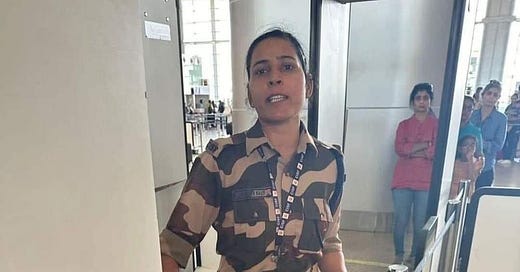Kangana Ranaut Episode {Update}: Delving into the Legalese
Legal Implications of the IPC Sections Invoked and Protection under the CISF Act, 1968.
Legal Implications and Protection Under the CISF Act
The incident involving a CISF woman constable Kulvinder Kaur, who allegedly slapped BJP leader and actor Kangana Ranaut at the Chandigarh Airport last afternoon, has led to her being booked under Sections 323 and 341 of the Indian Penal Code (IPC). As per Mohali Police sources, she has not been arrested yet. Understanding the implications of these sections is crucial in grasping the legal trajectory of this case.
Section 323 IPC: Voluntarily Causing Hurt
Section 323 IPC deals with the punishment for voluntarily causing hurt. According to this section, anyone who voluntarily causes hurt to another person, except in cases covered under Section 334 IPC, can be punished with imprisonment for up to one year, a fine of up to ₹1000, or both. The essential elements of this offence include the voluntary nature of the act, causing bodily pain, disease, or infirmity to the victim, and the presence of physical contact. Importantly, it should not be the result of grave and sudden provocation. As a non-cognizable offence, the police cannot arrest without a warrant, and it is also bailable and compoundable at the court's discretion, meaning it can be settled.
Section 341 IPC: Wrongful Restraint
Section 341 IPC prescribes punishment for wrongful restraint, defined under Section 339 IPC as voluntarily obstructing someone from proceeding in a direction they have the right to. The punishment for this offence is simple imprisonment for up to one month, a fine of up to ₹500, or both. Similar to Section 323, Section 341 is also a non-cognizable and bailable offence, requiring a warrant for arrest and allowing the accused to be released on bail.
Legal Conundrum
Given that both Sections 323 and 341 IPC are non-cognizable offences, the police cannot register an FIR or commence an investigation without the orders of a judicial court. This legal nuance perhaps means that for any further action, the complainant—in this case, likely Kangana Ranaut or her representatives—must file a private complaint before a judicial criminal court. The court then has the discretion to summon the accused and proceed with the case, in accordance with the provisions of the CrPC.
However, the official version by the Mohali Police may disclose different details of the FIR.
Protection under the CISF Act, 1968
The Central Industrial Security Force (CISF) Act, 1968 provides protection to its personnel for actions taken in good faith through two key sections:
Section 60 - Protection of Action Taken in Good Faith
No suit, prosecution, or other legal proceeding shall lie against any officer or other employee of the Central Government or the State Government for anything done in good faith or intended to be done in pursuance of this Act or any rule or order made thereunder.
Section 74 - Indemnity for Acts Done in Good Faith
No suit, prosecution, or other legal proceeding shall lie against any public servant for anything done in good faith or intended to be done under this Act or the rules.
Both sections provide immunity to CISF personnel from legal proceedings, such as suits or prosecutions, for actions taken or intended to be taken in good faith while discharging their duties under the CISF Act or rules made under it. Section 60 specifically covers officers and employees of the Central and State Governments, while Section 74 more broadly covers any public servant acting under the CISF Act. This legal protection enables CISF personnel to carry out their duties without fear of undue litigation, ensuring that they can perform their roles effectively and with confidence.
Departmental Action is Possible
The protection of CISF personnel discussed hereinbefore is available only in relation to criminal and civil cases lodged against them. This does not provide immunity for actions that constitute misconduct or misdemeanour, which do not amount to a criminal offence. For such infractions, departmental actions may be initiated. The range of disciplinary measures includes, at the maximum, dismissal from service, and at the minimum, a simple censure. Typically, both departmental proceedings and criminal prosecution can proceed independently of each other.
Ensuring Fair Investigation
In light of these legal intricacies, it is essential that any investigation or legal action be conducted without external pressures or influences. Ensuring a fair and transparent process will uphold the principles of justice and prevent any escalation of tensions. Moreover, it highlights the need for the involved parties, including the worthy MP, to act in a manner befitting their positions, promoting dialogue and understanding over division and hostility.
Concluding Appeal for Restraint and Unity
The focus should be on resolving issues through dialogue and mutual respect, recognising the contributions and grievances of all stakeholders. By fostering a spirit of cooperation and understanding, we can navigate this incident constructively and ensure that such conflicts do not undermine the fabric of our society. Leaders and citizens alike must strive to maintain harmony and uphold the principles of justice and unity, allowing a free and fair investigation to proceed without undue influence, in due process of law.
If you believe this article would interest someone you know, please feel free to share it anonymously (for us), using any medium you prefer. Thank you for considering it!






